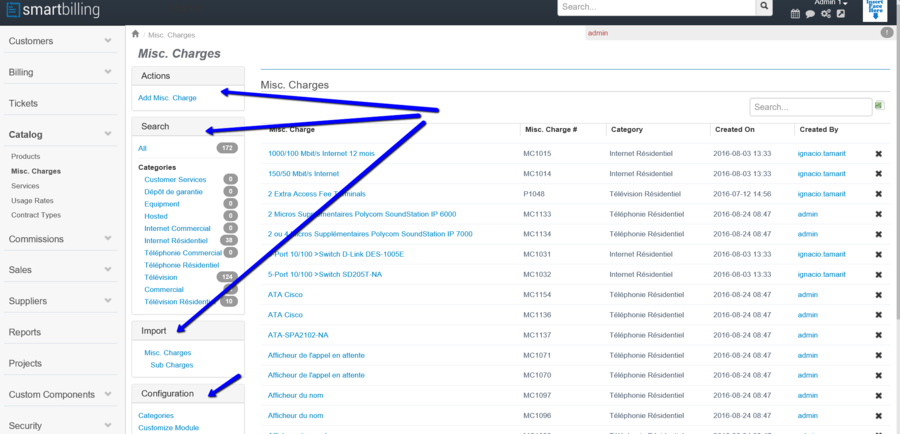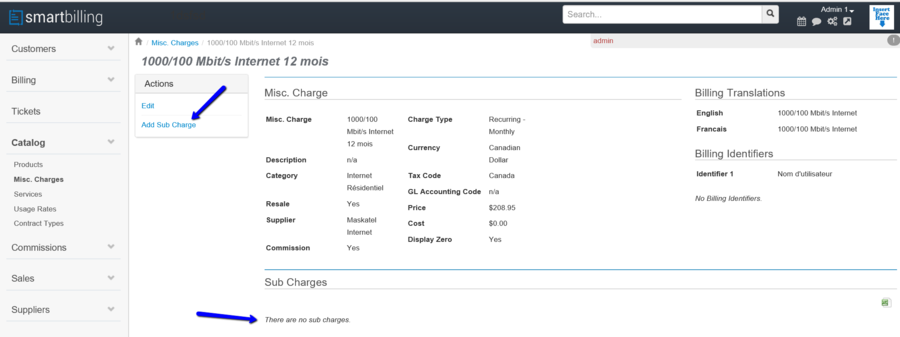Difference between revisions of "Charges & Sub-Charges"
(→Miscellaneous & Sub Charges) |
(→Miscellaneous & Sub Charges) |
||
| Line 8: | Line 8: | ||
Operators define one or more of the following charges, but they are not limited to only these charges. There could be some other type of charges depending on country, location, and business situation. Here some examples | Operators define one or more of the following charges, but they are not limited to only these charges. There could be some other type of charges depending on country, location, and business situation. Here some examples | ||
| − | Initiation Charges: These are one-time charges, which can be taken from the customer as a part of installation, activation, service, or initiating a connection. | + | Initiation Charges: These are one-time charges, which can be taken from the customer as a part of installation, activation, service, or initiating a connection. |
| − | Periodic Charges: These are the charges, which can be applied on monthly or bi-monthly or yearly basis as a rental of the product and service provided. | + | |
| + | Periodic Charges: These are the charges, which can be applied on monthly or bi-monthly or yearly basis as a rental of the product and service provided. | ||
| + | |||
Termination Charges: These are the charges, which can be applied on termination of the product and service. | Termination Charges: These are the charges, which can be applied on termination of the product and service. | ||
| + | |||
Suspension Charges: These are the charges, which can be applied if a product is suspended because of some reason; for example, non-payment. | Suspension Charges: These are the charges, which can be applied if a product is suspended because of some reason; for example, non-payment. | ||
| + | |||
Suspension Periodic Charges: There could be a requirement to charge a customer periodically even if a customer is suspended because of some reason. | Suspension Periodic Charges: There could be a requirement to charge a customer periodically even if a customer is suspended because of some reason. | ||
| + | |||
Re-activation Charges: Assuming a product was suspended due to some reason and now it needs its activation, an operator can apply re-activation charges for this service. | Re-activation Charges: Assuming a product was suspended due to some reason and now it needs its activation, an operator can apply re-activation charges for this service. | ||
Revision as of 10:58, 27 October 2016
Home FAQ page SmartBilling 5.0
Miscellaneous & Sub Charges
Operators define one or more of the following charges, but they are not limited to only these charges. There could be some other type of charges depending on country, location, and business situation. Here some examples
Initiation Charges: These are one-time charges, which can be taken from the customer as a part of installation, activation, service, or initiating a connection.
Periodic Charges: These are the charges, which can be applied on monthly or bi-monthly or yearly basis as a rental of the product and service provided.
Termination Charges: These are the charges, which can be applied on termination of the product and service.
Suspension Charges: These are the charges, which can be applied if a product is suspended because of some reason; for example, non-payment.
Suspension Periodic Charges: There could be a requirement to charge a customer periodically even if a customer is suspended because of some reason.
Re-activation Charges: Assuming a product was suspended due to some reason and now it needs its activation, an operator can apply re-activation charges for this service.
Smartbilling Misc. Charges dashboard allows the operator to configure and customise the module, import miscellaneous charges and sub charges and work with the Misc. Charge list.
Sub charges could be created under misc. charges in order to provide for further dimension of the pricing complexities of today, like discounts, charges conditional to time or usage, etc., etc. This complexity allows the creation of Grouped Offers (Bundles, Price Plans), i.e. Groupings of Catalog Items and other Grouped Offers:

